Should型虚拟语气
虚拟语句:should型虚拟和虚拟固定句式
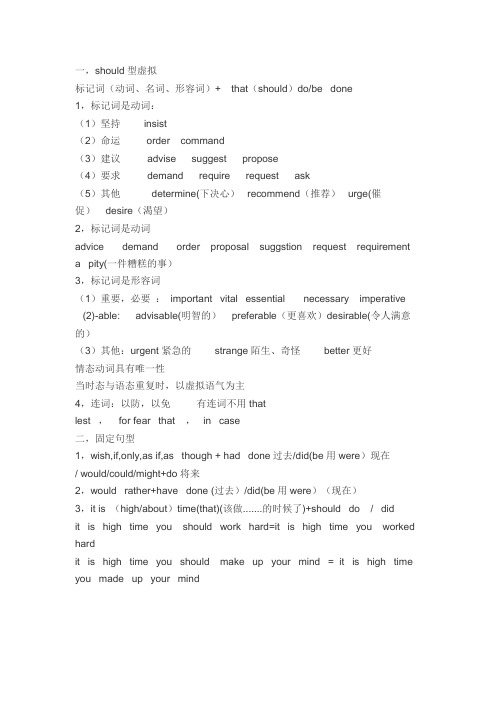
一,should型虚拟标记词(动词、名词、形容词)+ that(should)do/be done1,标记词是动词:(1)坚持insist(2)命运 order command(3)建议advise suggest propose(4)要求demand require request ask(5)其他determine(下决心)recommend(推荐)urge(催促) desire(渴望)2,标记词是动词advice demand order proposal suggstion request requirement a pity(一件糟糕的事)3,标记词是形容词(1)重要,必要:important vital essential necessary imperative (2)-able: advisable(明智的) preferable(更喜欢)desirable(令人满意的)(3)其他:urgent紧急的strange陌生、奇怪better更好情态动词具有唯一性当时态与语态重复时,以虚拟语气为主4,连词:以防,以免有连词不用thatlest , for fear that ,in case二,固定句型1,wish,if,only,as if,as though + had done过去/did(be用were)现在/ would/could/might+do将来2,would rather+have done (过去)/did(be用were)(现在)3,it is (high/about)time(that)(该做.......的时候了)+should do / didit is high time you should work hard=it is high time you worked hardit is high time you should make up your mind = it is high time you made up your mind。
虚拟语气should do结构
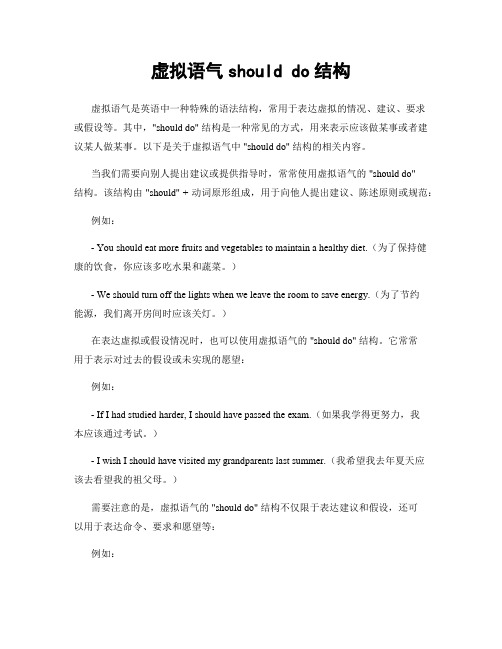
虚拟语气should do结构虚拟语气是英语中一种特殊的语法结构,常用于表达虚拟的情况、建议、要求或假设等。
其中,"should do" 结构是一种常见的方式,用来表示应该做某事或者建议某人做某事。
以下是关于虚拟语气中 "should do" 结构的相关内容。
当我们需要向别人提出建议或提供指导时,常常使用虚拟语气的 "should do"结构。
该结构由 "should" + 动词原形组成,用于向他人提出建议、陈述原则或规范:例如:- You should eat more fruits and vegetables to maintain a healthy diet.(为了保持健康的饮食,你应该多吃水果和蔬菜。
)- We should turn off the lights when we leave the room to save energy.(为了节约能源,我们离开房间时应该关灯。
)在表达虚拟或假设情况时,也可以使用虚拟语气的 "should do" 结构。
它常常用于表示对过去的假设或未实现的愿望:例如:- If I had studied harder, I should have passed the exam.(如果我学得更努力,我本应该通过考试。
)- I wish I should have visited my grandparents last summer.(我希望我去年夏天应该去看望我的祖父母。
)需要注意的是,虚拟语气的 "should do" 结构不仅限于表达建议和假设,还可以用于表达命令、要求和愿望等:例如:- The teacher insisted that the students should finish their assignments by tomorrow.(老师坚持要求学生们明天之前完成作业。
虚拟语气should的用法
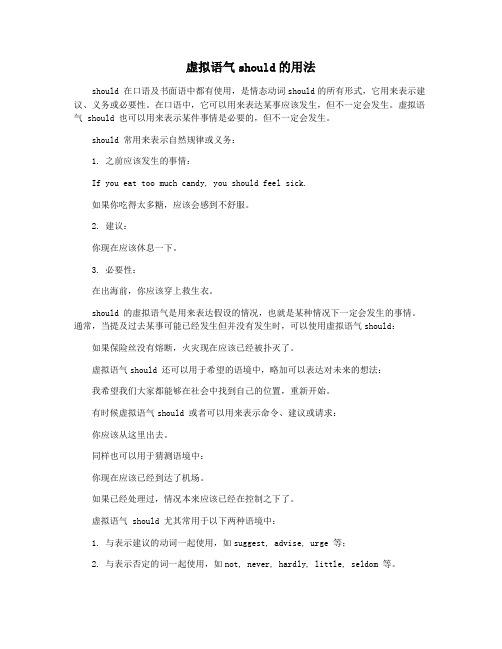
虚拟语气should的用法should 在口语及书面语中都有使用,是情态动词should的所有形式,它用来表示建议、义务或必要性。
在口语中,它可以用来表达某事应该发生,但不一定会发生。
虚拟语气 should 也可以用来表示某件事情是必要的,但不一定会发生。
should 常用来表示自然规律或义务:1. 之前应该发生的事情:If you eat too much candy, you should feel sick.如果你吃得太多糖,应该会感到不舒服。
2. 建议:你现在应该休息一下。
3. 必要性:在出海前,你应该穿上救生衣。
should 的虚拟语气是用来表达假设的情况,也就是某种情况下一定会发生的事情。
通常,当提及过去某事可能已经发生但并没有发生时,可以使用虚拟语气should:如果保险丝没有熔断,火灾现在应该已经被扑灭了。
虚拟语气should 还可以用于希望的语境中,略加可以表达对未来的想法:我希望我们大家都能够在社会中找到自己的位置,重新开始。
有时候虚拟语气should 或者可以用来表示命令、建议或请求:你应该从这里出去。
同样也可以用于猜测语境中:你现在应该已经到达了机场。
如果已经处理过,情况本来应该已经在控制之下了。
虚拟语气 should 尤其常用于以下两种语境中:1. 与表示建议的动词一起使用,如suggest, advise, urge 等;2. 与表示否定的词一起使用,如not, never, hardly, little, seldom 等。
从现在的角度考虑,虚拟语气should 能够帮助人们表达在非实际条件下应该发生的情况,从而更加清楚地表达想要表达的意思。
因此,应该更加熟练地掌握这一语气,以最大化地运用它带来的便利。
虚拟语气shoulddo结构
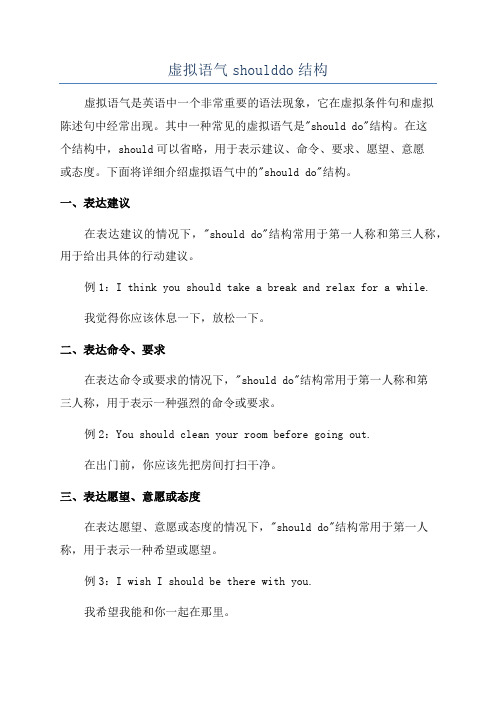
虚拟语气shoulddo结构虚拟语气是英语中一个非常重要的语法现象,它在虚拟条件句和虚拟陈述句中经常出现。
其中一种常见的虚拟语气是"should do"结构。
在这个结构中,should可以省略,用于表示建议、命令、要求、愿望、意愿或态度。
下面将详细介绍虚拟语气中的"should do"结构。
一、表达建议在表达建议的情况下,"should do"结构常用于第一人称和第三人称,用于给出具体的行动建议。
例1:I think you should take a break and relax for a while.我觉得你应该休息一下,放松一下。
二、表达命令、要求在表达命令或要求的情况下,"should do"结构常用于第一人称和第三人称,用于表示一种强烈的命令或要求。
例2:You should clean your room before going out.在出门前,你应该先把房间打扫干净。
三、表达愿望、意愿或态度在表达愿望、意愿或态度的情况下,"should do"结构常用于第一人称,用于表示一种希望或愿望。
例3:I wish I should be there with you.我希望我能和你一起在那里。
四、虚拟条件句在虚拟条件句中,"should do"结构常用于if从句中,表示一种假设、猜测或推测。
例4:If I were you, I should take the job offer.如果我是你,我应该接受这份工作。
以上是关于虚拟语气中的"should do"结构的介绍,该结构在日常英语中使用非常频繁,用于表示建议、命令、要求、愿望、意愿或态度。
熟练掌握该结构的用法对于提升英语口语表达能力非常有帮助。
should+从句的用法
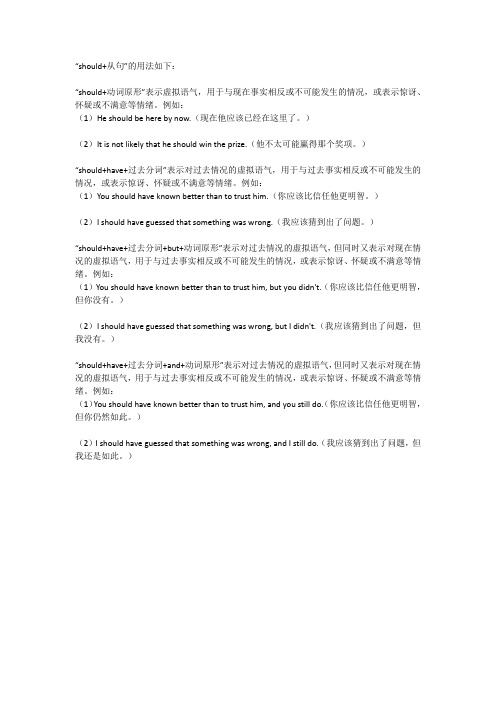
“should+从句”的用法如下:“should+动词原形”表示虚拟语气,用于与现在事实相反或不可能发生的情况,或表示惊讶、怀疑或不满意等情绪。
例如:(1)He should be here by now.(现在他应该已经在这里了。
)(2)It is not likely that he should win the prize.(他不太可能赢得那个奖项。
)“should+have+过去分词”表示对过去情况的虚拟语气,用于与过去事实相反或不可能发生的情况,或表示惊讶、怀疑或不满意等情绪。
例如:(1)You should have known better than to trust him.(你应该比信任他更明智。
)(2)I should have guessed that something was wrong.(我应该猜到出了问题。
)“should+have+过去分词+but+动词原形”表示对过去情况的虚拟语气,但同时又表示对现在情况的虚拟语气,用于与过去事实相反或不可能发生的情况,或表示惊讶、怀疑或不满意等情绪。
例如:(1)You should have known better than to trust him, but you didn't.(你应该比信任他更明智,但你没有。
)(2)I should have guessed that something was wrong, but I didn't.(我应该猜到出了问题,但我没有。
)“should+have+过去分词+and+动词原形”表示对过去情况的虚拟语气,但同时又表示对现在情况的虚拟语气,用于与过去事实相反或不可能发生的情况,或表示惊讶、怀疑或不满意等情绪。
例如:(1)You should have known better than to trust him, and you still do.(你应该比信任他更明智,但你仍然如此。
表示建议的虚拟语气

表示建议的虚拟语气建议是一种表达主观看法,主要用于提出建议、请求和意愿。
在虚拟语气中,表示建议的句子通常以“should”或“suggest”等词开头。
下面是一些表示建议的虚拟语气句子的例子:1. I suggest that you should exercise regularly to stay healthy.(我建议你应该定期锻炼保持健康。
)2. It is essential that we should save money for the future.(我们应该为未来存钱是必要的。
)3. They recommend that she should take a vacation to relax.(他们建议她应该休假放松一下。
)4. The doctor suggested that he should quit smoking immediately. (医生建议他应该立即戒烟。
)5. It would be a good idea if you should consider taking a cooking class.(如果你考虑参加烹饪课程将是一个好主意。
)6. I think it would be wise for him to apologize for his actions. (我认为他道歉是明智的。
)7. The teacher recommends that the students should read more books to improve their vocabulary.(老师建议学生们应该多读书以提高词汇量。
)8. It is important that the government should invest more in education.(政府应该在教育方面投入更多是很重要的。
)9. I suggest that we should go to the beach for a picnic this weekend.(我建议这个周末我们应该去沙滩野餐。
6.2虚拟语气之should
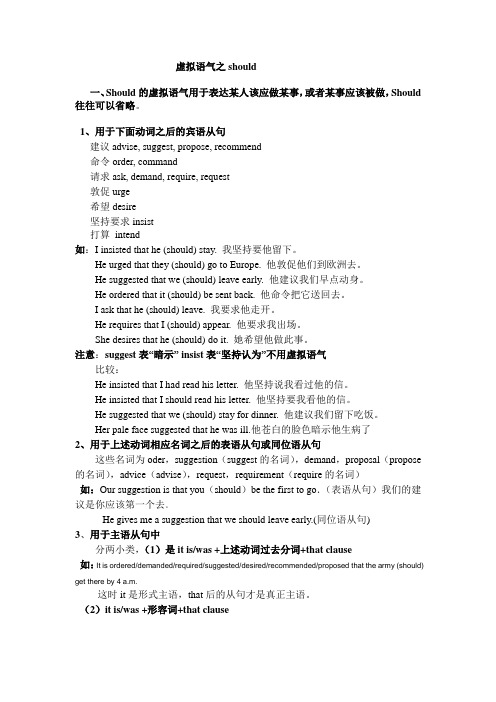
虚拟语气之should一、Should的虚拟语气用于表达某人该应做某事,或者某事应该被做,Should 往往可以省略。
1、用于下面动词之后的宾语从句建议advise, suggest, propose, recommend命令order, command请求ask, demand, require, request敦促urge希望desire坚持要求insist打算intend如:I insisted that he (should) stay. 我坚持要他留下。
He urged that they (should) go to Europe. 他敦促他们到欧洲去。
He suggested that we (should) leave early. 他建议我们早点动身。
He ordered that it (should) be sent back. 他命令把它送回去。
I ask that he (should) leave. 我要求他走开。
He requires that I (should) appear. 他要求我出场。
She desires that he (should) do it. 她希望他做此事。
注意:suggest表“暗示” insist表“坚持认为”不用虚拟语气比较:He insisted that I had read his letter. 他坚持说我看过他的信。
He insisted that I should read his letter. 他坚持要我看他的信。
He suggested that we (should) stay for dinner. 他建议我们留下吃饭。
Her pale face suggested that he was ill.他苍白的脸色暗示他生病了2、用于上述动词相应名词之后的表语从句或同位语从句这些名词为oder,suggestion(suggest的名词),demand,proposal(propose 的名词),advice(advise),request,requirement(require的名词)如:Our suggestion is that you(should)be the first to go.(表语从句)我们的建议是你应该第一个去。
虚拟语气should的用法
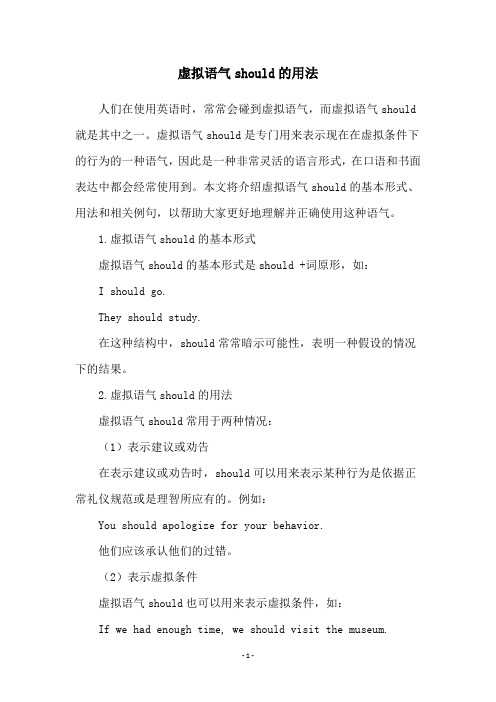
虚拟语气should的用法人们在使用英语时,常常会碰到虚拟语气,而虚拟语气should 就是其中之一。
虚拟语气should是专门用来表示现在在虚拟条件下的行为的一种语气,因此是一种非常灵活的语言形式,在口语和书面表达中都会经常使用到。
本文将介绍虚拟语气should的基本形式、用法和相关例句,以帮助大家更好地理解并正确使用这种语气。
1.虚拟语气should的基本形式虚拟语气should的基本形式是should +词原形,如:I should go.They should study.在这种结构中,should常常暗示可能性,表明一种假设的情况下的结果。
2.虚拟语气should的用法虚拟语气should常用于两种情况:(1)表示建议或劝告在表示建议或劝告时,should可以用来表示某种行为是依据正常礼仪规范或是理智所应有的。
例如:You should apologize for your behavior.他们应该承认他们的过错。
(2)表示虚拟条件虚拟语气should也可以用来表示虚拟条件,如:If we had enough time, we should visit the museum.如果我们有足够的时间,我们应该去参观博物馆。
3.虚拟语气should的相关例句(1)He should go now.他现在应该走了。
(2)If I had enough money, I should buy a new car.如果我有足够的钱,我应该买一辆新车。
(3)You should not drive so fast.你不应该开得那么快。
(4)If I had known about it earlier, I should have come to help.如果我早知道,我应该来帮忙的。
(5)If you finish your work on time, you should take a holiday.如果你按时完成工作,你应该休息一下。
- 1、下载文档前请自行甄别文档内容的完整性,平台不提供额外的编辑、内容补充、找答案等附加服务。
- 2、"仅部分预览"的文档,不可在线预览部分如存在完整性等问题,可反馈申请退款(可完整预览的文档不适用该条件!)。
- 3、如文档侵犯您的权益,请联系客服反馈,我们会尽快为您处理(人工客服工作时间:9:00-18:30)。
专四的Should型虚拟语气专题
1. It is imperative that students____ their term papers on time. (04真题,46题)
A. hand in
B. would hand in
C. have to hand in
D. handed in
[答案]A.学生必须准时交学期论文。
本题考虚拟语气。
It is imperative, vital, important, essential, etc. +that 引导的从句用(should)do虚拟形式,should可省。
2. I am surprised__ this city is a dull place to live in.
(06真题,57题)
A that you should think
B by what you are thinking
C that you would think
D with what you were thinking
[答案]A.我感到奇怪的是你竟会认为住在这个城市很乏味。
本题考虚拟语气。
在表示建议、命令、要求、惊讶以及表示“重要性”和“紧迫性”等含义的主
语从句、宾语从句、表语从句和同位语从句中,谓语动词常用虚拟语气,由“动
词原形”或“(should)+动词原形”构成。
3. It is imperative that the government __ more investment into the shipbuilding industry.(06真题,59题)
A attracts
B shall attract
C attract
D has to
[答案]C. 政府为造船业吸引更多的资金是极其重要的。
本题考虚拟语气。
做表
语用的should(必须的,必要的)后面的主语从句中用虚拟语气。
4. It is absolutely essential that William ________his study in spite of some learning difficulties.(07年真题,65题)
A. will continue
B. continued
C. continue
D. continues
[答案]C.尽管学习很难,威廉姆还是英爱继续学业,这点十分重要。
本题考查的是虚拟语气。
It is essential (important/necessary, etc.) that + sb. + (should) do sth. 是一种虚拟结构形式,其中从句的should常可省去。
5. Our tour guide recommended that we _____ as attentive as possible when we visit the Great British Museum. (模拟1, 13题)
A. are
B. shall be
C. be
D. were [答案] C,recommend 后面跟虚拟原形。
6. Jean Wagner's most enduring contribution to the study of Afro-American Poetry is his insistence that it in a religious, as well as worldly, frame of reference.(模拟4, 55题)
A. is to be analyzed
B. has been analyzed
C. be analyzed
D. should have been analyzed
[答案] C,本句包含名词insistence 引导的从句须用虚拟语气,即(should)+动词原形。
此外,从前文可知时态为现在时。
故选项C 为正确答案。
7. The board deemed it's urgent that these files right away. (模拟4, 66题)
A. had to be printed
B. should have been printed
C. must be printed
D. should be printed
[答案] D. urgent一词要求后面从句须用虚拟语气遥,而选项B should have been printed指过去的愿望,因此选项D为正确答案。
8. She always put her medication on the top of the shelf
lest the children it by mistake.(模拟6,13题)
A. took
B. should take
C. had taken
D. would take [答案]B.Lest后从句谓语动词要求用虚拟语气should do.
9. It is necessary that an efficient worker his work
on time.(模拟8, 16题)
A. accomplishes
B. can accomplish
C. accomplish
D. will accomplish
[答案]C. It is necessary that 这一主语从句中谓语须用should + 动词原形的虚拟形式,这里should 省略。
10. She put an extra blanket over the baby for fear that_____.(模拟8, 22题)
A. he catches cold
B. he should catch cold
C. he caught cold
D. he be catching cold
答案] B. for fear that 后接虚拟语气,(should)+ 动词原形。
11. Let Marry hide the candies for fear that the kid ______ too much. (模拟9, 24题)
A. couldn’t eat
B. could eat
C. should eat
D. shouldn’t eat
[答案]C. 本句意为:让玛丽把糖果收起来,以免孩子吃得太多。
for fear that 引导目的状语从句,表示(以免,惟恐),从句的谓语动词用原形或“should+动词原形”.
12. It is desirable that you ____ present at the meeting. (模拟9, 25题)
A. be
B. are
C. could be C. must be
[答案]A. 本句意为:希望你能够出席会议。
本句考查虚拟语气在主语从句中的应用。
主语从句中的谓语动词用“(should)+动词原形”。
13.Bill’s English teacher recommends that he______ a regular degree program.(模拟9, 31题)
A. begin
B. begins
C. will begin
D. is beginning
[答案] A. 在表示命令、请求、建议等动词后的宾语从句中,谓语动词用“should+
动词原形”, should常省略。
